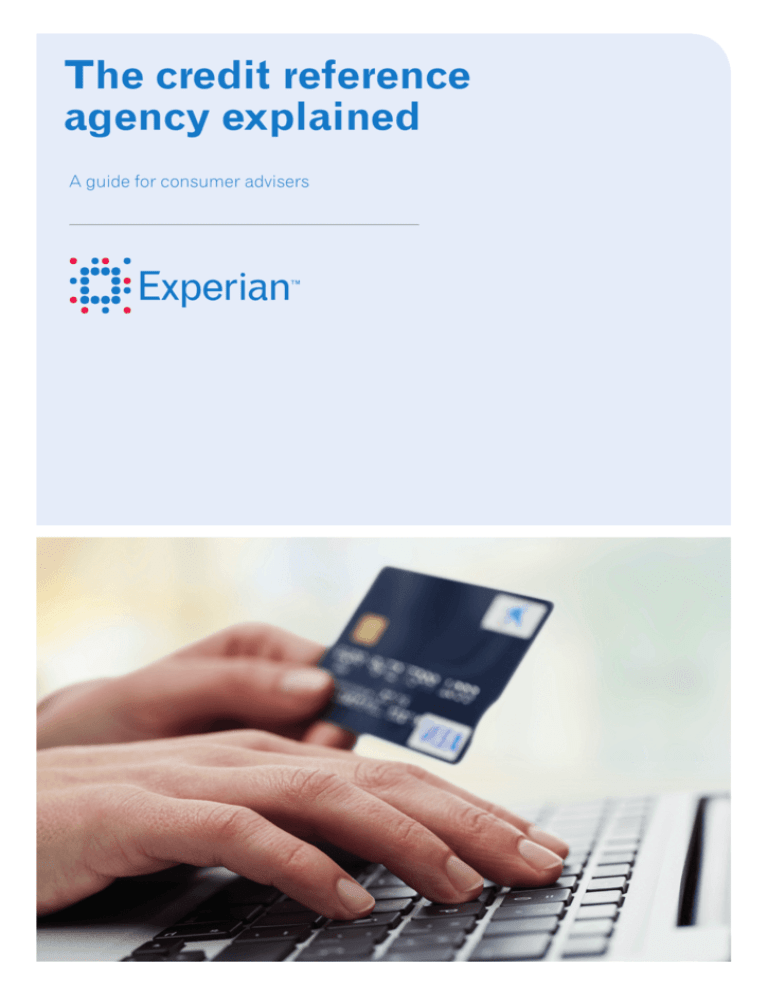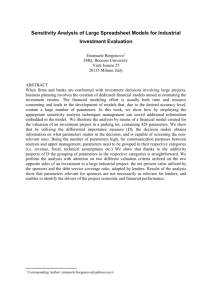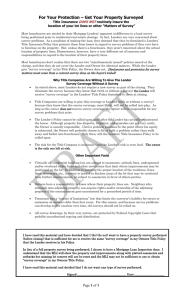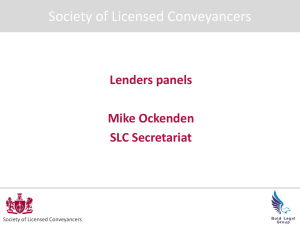
The credit reference
agency explained
A guide for consumer advisers
The credit reference agency explained
This Experian booklet is a guide for anyone whose role involves giving
information to consumers. It aims to give a straightforward explanation of our
(Experian’s) credit reference agency, what information we hold, where this
information comes from and how people use it.
For example:
• we do not make lending decisions – the lenders make these;
• we are not told which applications are successful or refused, and we do not
know why a consumer has been refused credit;
• we do not hold a blacklist of people or properties; and
• the information we hold usually helps people get credit.
For most people, credit is an important part of their life. There are very few people
who do not have some type of credit agreement, such as a car loan, a credit or
charge card, an overdraft, a mortgage, a mobile phone or a mail order account.
The role of a credit reference agency (sometimes known as a CRA) is to make it
possible for lenders to quickly make fair, consistent, responsible and profitable
lending decisions. Credit referencing also helps lenders guard against fraud,
which is a growing and serious problem.
As the UK’s largest credit reference agency, we provide factual information to
businesses, including banks, building societies, finance houses, mobile phone
companies and major retailers. This information, often with the details given by
a consumer on an application form, helps lenders decide quickly whether or not
the person applying for credit can afford it and is likely to repay.
“Credit reporting...allows lenders to evaluate the borrowing
capacity of clients. And it lets good borrowers benefit from
more and cheaper lending.”
World Bank, Doing Business 2008
Contents
4
What is a credit reference agency?
Why do we have CRAs?
CRAs and the law
CRAs in other countries
6
What is credit reference information? Public information Credit account information Searches which leave ‘footprints’ Preventing fraud
Factual information
7
Helping consumers understand the information we hold
8
Financial Education
Customer Support Centre
10
The questions people ask
Lenders’ decisions Information about other people Court judgments Adding a statement to a credit report Amendments Credit repair
12
Identity fraud
13
Making sure information is accurate
14
Checking public information Checking credit account information Working with lenders Contact with the general public
Limiting access to information 16
When should consumers check the information we hold about them?
16
Getting a copy of the information we hold
16
Useful contacts 17
The credit reference agency explained | 3
What is a credit reference agency?
A credit reference agency (CRA) is
an independent organisation that
holds information about consumers
or businesses (or both), to help
organisations decide whether to give
them credit.
In the UK, when a consumer applies for
credit they give the lender information
about themselves and their finances.
The lender will also get more detailed
information from a CRA. They can do
this because lenders have all agreed
to share information about their
customers through the CRAs. They
each supply this information to the
CRAs to hold on their behalf. The CRAs
then act as independent go-betweens
and work with the lenders to make
sure the information is kept accurate
and up to date. Later in this booklet
you can find out more about how this
information is supplied and kept up to
date.
In the UK, there are three CRAs that
hold information about consumers
and five that hold information about
businesses. Experian is not only the
largest CRA in the UK but is also one
of the largest in the world. Other parts
of our business hold other sorts of
information, including information
about properties and about motor
vehicles.
Our CRA holds information from
many different sources. This booklet
explains the different types of
information that a CRA might hold.
Although lenders process most of their
credit checks using our CRA, there is
healthy competition between the three
consumer CRAs, particularly in certain
sectors.
We send and receive personal
information using highly secure
systems. We always make sure that
the information is properly protected
and that only people with the proper
authority can access it.
4 | The credit reference agency explained
Why do we have CRAs?
CRAs have existed in the UK for about
30 years, but most lenders only started
using them 15 to 20 years ago. Before
this, consumers had to give lenders
proof of their creditworthiness (how
likely it was they would repay any
credit) before they could borrow money.
This involved face-to-face meetings and
lots of paperwork, so it took a lot of time
and effort. Despite this, lenders were
never sure that they were seeing all they
needed to see to make a good decision.
As a result, they often lent money to
unsuitable borrowers and sometimes
refused to lend to creditworthy people.
These days it is very different.
The UK has one of the most advanced
credit systems in the world. The World
Bank carries out regular surveys and
their ‘Doing Business 2008’ report
rated the UK system as number one.
This is because the UK has a very
efficient credit-referencing system and
comprehensive consumer-credit laws
protecting consumers and lenders.
The highly developed UK system
means that lenders are less likely than
in many other countries to lend to
people or to organisations that will not
repay them. As a result, their losses
due to bad debt are lower and they can
afford to lend to people that they might
not have lent to otherwise. This means
more people can get credit to buy their
own home or a car, or to get other goods
and services on credit. This can help the
economy to grow by giving more people
and businesses access to credit and
by keeping lenders’ losses down. As
the economy grows it generates more
wealth, more jobs and more spending.
The result is a system that gives
consumers access to credit at any
time of day or night, every day of the
year. Consumers can apply for credit
over the phone or on the internet
and get a decision almost instantly.
What might not be obvious are the
sophisticated checks and assessments
that take place in the background, in
the space of a few seconds. Successive
governments have made this possible
by working closely with lenders, credit
reference agencies and consumer
advisers.
CRAs and the law
CRAs have to keep to a variety of laws
covering the information they can
hold and what they can do with it. For
example, the Representation of the
People Act sets out which organisations
can access the electoral roll and how
they can use it. As well as laws about
specific types of information, there are
several codes of conduct that cover
what CRAs and their clients can do.
Clients have to keep to these codes as
part of their contracts with the CRAs.
Credit reference information is
stored and accessed in line with
the Data Protection Act. CRAs
have regular meetings with the
Information Commissioner’s Office
(which is responsible for making
sure organisations keep to the Data
Protection Act), as well as with other
government departments.
The Information Commissioner’s
Office usually deals with complaints
about CRAs in the UK. Consumers can
also refer complaints about us to the
Financial Ombudsman Service, once
they have followed our complaints
procedure. You can find our complaints
procedure on our website.
CRAs in other countries
Many other countries have CRAs, but
they are all slightly different. Some are
publicly owned monopolies, some are
owned by the banks. Some countries
only allow public information (such
as court judgments) to be shared.
Some allow both public and private
information to be shared, but they
restrict private information to credit
account ‘defaults’. (A default is an
account the consumer has broken the
terms of.)
The credit reference agency explained | 5
What is credit reference information?
The information we hold comes from
several sources but falls into two
main categories – public information
and credit account information.
Public information
The public information we hold is
made up of the following.
• Information from the full electoral
roll, which householders give
to local authorities. The roll is
published each December and
updated monthly. Lenders use
this information to help them
confirm names and addresses.
Under the Representation of
the People Act, credit reference
agencies can buy copies of
the full electoral roll (which
includes the name of every
voter). They can then make
this available to lenders for
certain limited purposes. These
purposes include assessing
credit applications, identifying
customers and helping to
prevent fraud.
6 | The credit reference agency explained
• Court judgments and Scottish
decrees, supplied by Registry
Trust, which holds a list of
judgments on behalf of the
Ministry of Justice.
• Bankruptcies, debt relief
orders, individual voluntary
arrangements and administration
orders, which come from the
Insolvency Service.
Credit account information
The UK’s major lending companies
have agreed to share details of their
customers’ credit agreements. This
means that when someone applies
for credit, the lender can check they
have repaid other lenders in the
recent past or are repaying current
credit agreements. They can also
check how much the consumer
already owes to other lenders and
how they are managing these
existing credit agreements, to help
them decide if the consumer can
afford to take on further credit.
So that lenders can see each other’s
information, they store information
about their customers with us. We
act as a go-between in the sharing
process but do not own
the information.
They can only do this with their
customers’ knowledge. So when a
consumer applies for credit, they
usually give the lender permission
to share information with other
lenders through the credit reference
agencies. This includes details about
the application and about any credit
the lender then grants.
As a result, the credit account
information we hold is simply a copy
of the information all the different
lenders hold. These lenders update
our database each month.
Lenders who get access to this
credit account information through
us are members of a scheme called
CAIS (Credit Account Information
Sharing).
CAIS is run in line with the Data
Protection Act 1998. Members of
CAIS are also strictly regulated
under a contract between the lender
and us and under a cross-industry
agreement called the ‘Principles
of Reciprocity’. These are the strict
rules which have been agreed by the
lenders who share information as
members of the scheme. These rules
clearly say how the information may
be used. For example, they say that
credit account information cannot
be used to target another members’
customers for marketing. They also
say that lenders can get access to
credit account information only if
they provide similar information to
share.
Searches which leave ‘footprints’
When a lender wants to process an
application for credit, they search
our database for information about
the person applying at their current
address and any recent previous
addresses. Lenders can also carry out
a search for other reasons, such as to
give someone a quotation or to check
their identity.
We keep records of these searches
for one year. ‘Footprints’ are left on
the database each time a search is
made, detailing which company has
accessed the database, when and
why. This allows people to see who
has searched for information about
them.
This record of searches forms
part of the information seen by
lenders, although they do not see
who has accessed the information.
The record allows them to identify
‘abnormal activity’ (a large number
of applications for credit made by
the same person in a short space of
time), which could mean that person
is applying for credit they cannot
afford, or that someone is trying to
commit fraud in their name.
Shopping around for the best credit
deal should not look like abnormal
activity because a lender should only
carry out a credit application search
when someone actually applies
for credit. When shopping around,
people usually get basic details of
offers from a range of lenders and
probably only apply for what they
consider to be the best deal. If the
lender is carrying out a credit check
just to give someone a quote, they
should record this as a quotation
search. Lenders should always tell
the consumer, verbally or in writing,
if they are going to carry out a credit
check. They should also tell the
consumer, when they first open an
account, that their credit account
information is going to be stored
with a credit reference agency.
Non-credit searches may also be
carried out (with the consumer’s
permission) for other purposes
such as to confirm identity.
By law, the credit reference agency
must keep a record of all searches.
Other lenders see only creditapplication searches, but consumers
see all searches about them when
they apply for their credit report.
Preventing fraud
The UK’s Fraud Prevention Service
(cifas) provides information to our
database to allow its members to
guard against fraud. This shared
information also protects the
innocent victims of fraud – for
example, people who have had their
credit cards stolen.
Gone Away Information Network
(GAIN) members share information
when a customer who owes money
has moved without letting anyone
know.
Factual information
The information a credit reference
agency holds is entirely factual.
Credit reference agencies do not
hold information about people’s
race, religion, sexuality, political
beliefs, employment details, medical
history, Council Tax payments or
criminal records. Neither does it hold
information about savings accounts.
We do not hold a blacklist. We simply
have a database of the public and
credit account information described
earlier. The credit account information
we hold shows that most people are
repaying their credit agreements
according to their contracts.
“I have recently asked Experian to deal with various pieces of
information on my report. I would wish you to know that my
request has been handled professionally and competently.
As you no doubt usually receive complaints, I thought it
would be fair to Experian and helpful to you to let you know
that matters have been dealt with promptly and well.”
JE, London
The credit reference agency explained | 7
Credit scoring
Lenders often use credit scoring to
assess whether or not someone will
be able to pay back a debt on time
and in full. Someone’s a person’s
credit score is based on how similar
customers managed their credit
accounts. The exact way lenders
assess credit applications varies
from company to company, including
how they work out someone’s credit
score. We help many lenders develop
their credit-scoring systems, based
on their own policies. We helps many
lenders develop their credit- scoring
systems, based on each lender’s own
policies.
Different lenders use different
lending policies when looking at
the information supplied by a credit
reference agency and the separate
details they take from the person
applying for credit. These policies
depend on the amount of risk they
want to take when deciding whether
or not to grant credit. Using the same
information, one lender may say ‘Yes’
but another may say ‘No’.
We do not make any lending
decisions. Lenders do not tell us
how the information we provide
has affected a lending decision, nor
whether an application for credit has
been granted or refused. So, credit
reports do not show whether a lender
has refused or accepted a credit
application.
Helping consumers understand the
information we hold
Our consumer education programme
is committed to raising public
awareness of the information that
credit reference agencies hold, how
lenders use it and the rights people
have in relation to this information.
We rely on the media to print and
broadcast accurate information about
how we work so we provide material
for publication and are available for
interviews and to answer any media
questions. We also invite journalists
to see our business at work.
8 | The credit reference agency explained
As well as working closely with the
media, we also work with consumer
groups, people at all levels of
education, the credit industry and
organisations that provide advice
on money and debt (for example,
Citizens Advice, National Debtline,
StepChange Debt Charity or
Payplan). This makes sure that as
many people as possible know how
to get a copy of the information
we hold about them and that they
understand the information and
how it is used.
Consumers receiving advice about
debt from a free advice agency (such
as those listed in the last paragraph)
can ask for a free copy of their
Experian credit report.
Each year, we take our consumer
education stand around the country
to exhibitions such as the yearly
conferences of AdviceUK, the
Institute of Money Advisers, Money
Advice Scotland and the Trading
Standards Institute, as well as to
large national consumer shows.
On our website there is a wide range
of guides, including our ‘Credit
Crossroads’ guides which give
people advice about their credit
reports at particular times in their
lives and include the following titles.
awarded a quality mark by pfeg.
You can find the resource at www.
valuesmoneyandme.co.uk.
•
•
•
•
•
•
•
We support the Young Consumers
of the Year competition for 14- to
17-year-olds, giving the schools
that take part information about
consumer credit and helping set
questions about the process for
granting credit.
Refused credit
Moving home
Living together
Relationship breakdown
Bereavement or serious illness
Students and young people
Redundancy or reduction of
income
Financial education
We are involved in several consumer
education and financial literacy
projects (which aim to help people
make better financial decisions),
including those led by the Money
Advice Service and pfeg, the
financial-education charity. We
particularly focus on helping young
people develop the knowledge and
skills they need to manage their
finances now and in later years.
We have developed a teaching
resource called ‘Values, Money and
Me’ for primary-school children. It
is the UK’s first free online resource
specifically designed to help develop
the financial knowledge, attitudes
and abilities of young children.
Values, Money and Me has been
For details of all our free advice
guides and education resources, visit
www.experian.co.uk/consumer/
resources.html.
Customer Support Centre
The Data Protection Act and the
Consumer Credit Act give people the
right to see a copy of the information
a credit reference agency holds about
them. The fee for this is £2, which is
set by law.
Our Customer Support Centre
has more than 300 trained people
dedicated to helping members of the
public see, understand and improve
their credit reports.
Each year we answer more than
3.5 million requests for advice and
support.
The credit reference agency explained | 9
The questions people ask
Most people who contact us find out
all they need to know by seeing a
copy of their credit report and from
reading our booklet ‘Your credit
report explained’ and so have no
need to get in touch again. Many
of those who do contact us after
receiving their information just want
the information explained. But others
have more detailed questions.
Lenders’ decisions
As we do not make lending
decisions, we cannot tell people why
an application for credit has been
accepted or refused (because we do
not know) but we can and do explain
in detail the information we hold.
By law, lenders do not have to tell
people why they have refused an
application for credit, but under their
codes of practice and the ‘Guide to
credit scoring’ they should give the
main reason or reasons for refusal.
If information was provided by a
credit reference agency, the lender
should give the name and contact
details of the credit reference
agency they used but should also
say whether or not that information
played an important part in their
decision to refuse credit.
Lenders are understandably wary of
revealing details which could help
someone put together a successful
fraudulent application.
However, they must confirm whether
or not they used a credit scoring
system to process an application
and, if so, give a simple explanation
of how the system works.
Consumers have the right to ask for
an application to be dealt with by a
person and not by a computerised
scoring system.
To help people better understand how
credit scoring works, consumers can
now order their Experian Credit Score
with their credit report. Although
10 | The credit reference agency explained
lenders’ scores are also likely to be
based on information we don’t hold
(such as details of someone’s job and
wages), someone’s Experian Credit
Score is a good guide to how their
credit report will affect a lending
decision.
Information about other people
When people move to a new address,
financial information in the names
of the people who used to live there
cannot affect them. In the past,
lenders have been able to take
account of information about people
who have shared an address and
either have the same surname or a
joint financial link (such as a joint
mortgage), or have applied for credit
together.
Now, following an agreement
between lenders and the Information
Commissioner, lenders can only
take account of information about
people who share an address if they
also have a financial link. This link is
called an ‘association’ and is created
when two people apply for credit or
open an account together, or tell us
that they have financial ties.
This association will stay on their
reports until one of them tells us they
are no longer financially connected
and we can confirm this. We will then
break the link, as long as there are no
other associations between them.
Associations allow lenders to
take account of information about
anyone linked to the person applying
for credit. Most couples who live
together (whether or not they are
married) have financial links.
However, some lenders offer
people the choice of having a
credit application assessed using
information in their own name only.
This is called ‘opting out’ and means
that information about their partner
(or anyone else they are associated
with) would not be taken into
account.
To help prevent fraud, lenders can
still carry out background checks to
make sure that people choosing to
‘opt out’ are not simply trying to hide
a partner’s poor credit history.
When we send someone a copy
of their credit report, it includes
financial information about them
only. It will also show the names of
anyone they are associated with. If a
person believes that someone else’s
information is the reason for them
being refused credit, they might want
to ask that person to apply for their
own credit report. Of course, that
person does not have to order their
report or show it to the person who
applied for credit.
Court judgments
Some of the questions we receive
are about court judgments, such as
county court judgments and Scottish
decrees. These are recorded for six
years from the date of the judgment.
If a judgment has been paid within
one month of being issued, we
will remove it from a credit report
altogether. If it has been paid after
one month, we will mark it as
‘satisfied’. Registry Trust tells us
when to update court judgments.
In Scotland, consumers need to
contact the person or organisation
that took the case to court, known
as the ‘pursuer’, for proof of payment
and then send this to Registry Trust
with a £4 fee.
We advise people to use a notice to
explain any special circumstances
which led to financial difficulty. If
necessary, our Customer Support
Centre will help them write the
notice.
Adding a statement to a credit report
A notice of correction is a statement
of up to 200 words in which people
can explain the information held
about them.
Although it is officially called a notice
of correction, this statement is better
described as a notice of explanation.
The next section explains what we
do if a consumer disagrees with
information on their credit report.
We add a notice to a person’s credit
report and supply the notice to any
lender who sees the information
it relates to. This makes sure that
any future application for credit is
‘referred’ when it is being processed
– in other words, the lender must
read and take account of the notice.
Someone may miss several payments
on a credit agreement or get a county
court judgment or Scottish decree
against them because of a sudden
change in circumstances – for
example, redundancy or a personal
tragedy. But if the information we
hold is factually correct, despite the
circumstances, it cannot be altered
as it is a true account of a person’s
credit history.
Amendments
Of those people who receive copies
of the information we hold about
them, only a small percentage find
genuine mistakes.
We amend all mistakes as a matter
of urgency. It is not in our interest,
nor in that of the lenders, for any
information to be inaccurate.
If a consumer disagrees with any
piece of information, we mark
it as ‘disputed’ and contact the
organisation that provided it. We
work closely with lenders on behalf
of the consumer to make sure that
the information we hold is accurate.
We will tell any lender accessing a
report whether the consumer has
disagreed with any information on it.
In the case of a mistake in any credit
account information, an amendment
has to be authorised by the lender
concerned because that lender owns
the information. Lenders need to
amend their own records to guard
against mistakes being repeated
when they update our database.
The Information Commissioner’s
Office sometimes advises consumers
to contact the lender themselves.
If a mistake appears in public
information, we will work with the
public organisation concerned to put
the matter right.
If a consumer disagrees with any
public information in their credit
report, we also mark that information
as disputed.
“Your service has been
invaluable and I would
take this opportunity to
thank you very much
indeed for an excellent
and professional service,
not something one
expects these days
unfortunately – a great
pity other companies
cannot follow your
example.”
WH, Kent
The credit reference agency explained | 11
Credit repair
Credit repair companies claim to be
able to remove or change information
held by credit reference agencies.
They charge considerable amounts
for this ‘service’.
We believe the claims made by many
credit repair companies are false,
so we work with Citizens Advice
and other consumer groups and
money advisers, with local Trading
Standards Officers, solicitors and the
Information Commissioner’s Office
to make sure that people do not give
money to companies which claim to
be able to ‘repair’ credit information.
Credit repair companies may claim to
12 | The credit reference agency explained
be able to get rid of court judgments
or Scottish decrees. These stay on
record for six years from the date of
the judgment. They can be cancelled
if the amount owed is paid within a
month of the judgment being issued
or if a person genuinely has not
received the relevant summons. But
if a consumer says they have not
received a summons, it is likely to be
served again. The effect of beginning
the legal process again can increase
the length of time a court judgment
is recorded.
Anyone who has received a
summons but claims otherwise could
be breaking the law. People with
debt problems or questions about
their credit reference information
should contact a reputable money
adviser (such as at Citizens Advice)
or our Customer Support Centre,
where they can get free advice and
be told how they can put right any
genuine mistakes. We do not charge
consumers for the help and advice
we give them once they have got a
copy of their credit report.
Identity fraud
Most lenders use a range of
procedures to spot identity fraud
and prevent it from happening.
Although most fraud is prevented,
some fraudulent applications
are accepted because fraudsters
often use sophisticated methods
to trick lenders into believing their
applications are genuine. Identity
fraud often involves innocent people,
but we have a dedicated Victims of
Fraud team within our Customer
Support Centre to help people
quickly sort things out.
Our Victims of Fraud team regularly
deals with cases of identity fraud.
They are familiar with the ways of
fraudsters and the problems they
can cause, so they can give detailed
advice to help people put the
situation right
If a consumer thinks that someone
may be using their identity to get
credit, they should get a copy of
their credit report. They can quickly
spot any applications or accounts
that don’t belong to them because
a credit report includes a record of
recent applications for credit, along
with credit accounts taken out in the
last six years. We can arrange to send
people regular copies of their report.
This will help them check any further
applications made in their name.
If they think their post has been
redirected, they should check with
the local post office straight away.
various lenders, on the consumer’s
behalf, to help clear the matter up.
We can also add security features
to their credit report to obstruct the
fraudster. We can give free help and
advice once a consumer gets a copy
of their credit report. If they agree,
we will tell the other credit reference
agencies about the fraud so they can
offer similar help.
Our website includes lots of
information about preventing,
spotting and dealing with identity
fraud.
If a fraudster has used someone’s
identity or their existing accounts,
or has opened new accounts in
their name, we will add a note to the
consumer’s report and work with the
The credit reference agency explained | 13
Making sure information is accurate
Making sure information is accurate
is extremely important to lenders,
consumers and credit reference
agencies. As we have already
explained, the information we hold
is mainly a copy of information held
elsewhere – by local authorities,
other official organisations and
lenders.
But while we depend on lenders and
other organisations to provide correct
information, we accept a duty to do
everything possible to make sure that
the information we hold is accurate.
Quality-control checks are built in at
every stage of our work, from when
we firstreceive information to when
we pass it back to lenders.
Checking public information
Electoral roll information is provided
by householders to local authorities,
who then use this information to
put the public registers together.
Credit reference agencies buy
these registers from the local
authorities. Consumers can ask
their local authorities not to include
their names in the ‘edited register’,
which any organisation can buy
and use. But local authorities must
make the full registers available to
credit reference agencies, as long
as the names and addresses are
used strictly for certain ‘permitted
purposes’ which have been laid down
by law. These ‘permitted purposes’
include assessing credit applications,
preventing money laundering and
detecting crime.
Local authorities provide the
information electronically, but before
we load the information on to our
database we check it against the
previous year’s information.
If there is anything that does not
make sense or seems wrong, we
check it with the local authority
concerned.
14 | The credit reference agency explained
Once the information has been
loaded on to our database, we check
it again to make sure it was not
corrupted during the load.
Mistakes that have been made by
householders themselves when
filling in the registration form are not
easy to identify. If they are brought to
our attention, we can amend them,
although the local authority involved
has to agree to make the change.
For England and Wales, we receive
information about bankruptcies and
other insolvency records from the
Insolvency Service. The information
then goes through the same qualitycontrol measures as explained above.
Registry Trust Ltd gets information
about court judgments from original
court documents and then sends it
to us electronically. We check the
quality of the new information and
then check it against the information
we already hold. We contact Registry
Trust to get explanations for any
inconsistencies.
Checking credit account information
Lenders send us credit-account
information using a secure, dedicated
online link. The information sent is a
copy of the lenders’ own records.
When lenders first send us this
information, it goes through
more than 200 tests to find any
inconsistencies or obvious mistakes.
We then test it regularly after that.
Other tests tell us, for example, that:
•
•
•
updates are readable;
status codes (which show
whether or not an account is up
to date and, if not, how many
months have been missed) are
being applied correctly; and
names, addresses and dates
of birth are accurate.
Every month, lenders update the
credit account information we
hold. We make sure that we receive
updates on time, that we receive the
correct updates and that they contain
a valid number of records.
“I am so pleased that you
have followed up this
matter so carefully and
that you have updated
my report to show that
my address is now
recognised. Your efforts
on my behalf are truly
appreciated and I am very
grateful for the time you
have spent verifying and
amending my report.”
EW, Ashurst
We compare the number of active
records we hold on our database with
the number of updates. If updates
contain too few or too many records,
or if we find other inconsistencies,
the update is delayed so that we
can investigate inconsistencies and
correct mistakes before they reach
our database.
If any item of information is found to
be incorrect or incomplete, we work
with the provider to make sure the
record is amended. All amendments
go through an independent qualitycontrol process.
Working with lenders
A joint project between us and
individual lenders makes sure
that information supplied to us is
examined thoroughly and separately
from our regular, built-in qualitycontrol procedures.
Every six months, credit account
information goes through a full set of
quality tests, as though it had been
sent to us for the first time. We then
send audit reports to members of
CAIS, with recommendations on how
any improvements can be achieved.
We then follow this up with meetings
to make sure that everybody
understands any problems that have
been found and that we all commit to
sorting these problems out.
We try to work with members of CAIS
to make sure that the information we
hold is as accurate and as up to date
as possible.
Contact with the general public
Our Customer Support Centre plays
an important role in making sure that
the information we hold is accurate.
Being in contact with members of
the public every day means that
we are able to identify and alert
lenders promptly to areas where
improvements should be made.
We regularly review the audit tests to
make sure they are still relevant and
thorough.
The credit reference agency explained | 15
Limiting access to information
Access to the credit account
information we hold is strictly
limited.
Only lenders who are members
of CAIS can see it, and then only
with the consumer’s permission.
They must be companies who
grant credit and must be registered
with the Office of the Information
Commissioner under the Data
Protection Act.
Companies who access only public
information do not have to go
through such strict controls, because
the information is publicly available
from other sources.
We record all regular enquiries
and ‘footprints’ are left on the
database to allow every search to
be tracked so consumers can see
which organisations have accessed
information about them and when.
When should consumers check the
information we hold about them?
Providing general credit referencing
advice forms part of our ongoing
campaign to keep consumers
informed about the role and
responsibilities of our credit
reference agency.
It is important that people
understand for example, that:
• joint responsibility for debts
can continue after divorce, and
how the effects of this can be
reduced;
• applying for credit with another
person will mean they are linked
in the eyes of lenders, even if they
make an individual application
for credit in the future; and
• not being registered to vote at an
address might cause a lender to
refuse them credit.
16 | The credit reference agency explained
Many of the people who contact us
do so after having had an application
for credit refused. But as public
awareness of credit referencing
increases, so does the number of
enquiries from people who have
made successful credit applications,
are about to apply for credit or have
made no applications at all.
We believe this is a healthy trend and
we encourage people to check the
information we hold about them if
they have any concerns at all.
“Thank you so very much
for your e-mail I received
this morning. I am so
happy with your news that
my credit report has been
amended. Once again
thank you for all your help
and assistance and for the
extremely efficient and
fast service you provided.
I am absolutely delighted
with your level of customer
service, keep up the
excellent work and many
thanks.”
EH, County Tyrone
Getting a copy of the information
we hold
To allow our Customer Support
Centre to give useful advice,
consumers first need to get a copy of
the information we hold about them.
The easiest way for consumers to
order their credit report is by visiting
our website at www.experian.co.uk.
Here they can order a report for
£2 or use our online credit-report
monitoring service CreditExpert.
To receive a copy of their credit
report, consumers need to give us
their full name, date of birth and
current address along with any other
names and addresses used in the
past six years. All applications for a
credit report will go through identity
checks.
Our website also includes lots of
useful advice and guides about credit
reports, credit scoring and identity
fraud.
We do not normally provide creditreference information to anyone
other than the person it concerns, at
the address listed in our records as
their current address.
Once consumers have received their
credit-reference information, they can
contact our Customer Support Centre
if they have any questions or need
general advice.
People who use our CreditExpert
service receive regular updates
whenever their credit report changes
significantly. They can also use the
Experian Credit Score to understand
how their credit report might
influence a credit application, and
what they might be able to do to
improve how they are rated for credit.
Consumers can try CreditExpert for
30 days by visiting www.creditexpert.
co.uk.
We provide free reports to victims of
identity fraud and to people receiving
free help, from a not-for-profit advice
agency, with unmanageable debt.
Debt advisers who want to register
for our free-report service should
send an email to customer.services@
uk.experian.com.
Useful contacts
Experian Customer Support Centre
PO Box 8000
Nottingham
NG80 7WF
Information Commissioner’s Office
Wycliffe House
Water Lane
Wilmslow
SK9 5AF
Phone: 01625 545 745
www.ico.org.uk
Financial Ombudsman Service
South Quay Plaza
183 Marsh Wall
London
E14 9SR
Phone: 0800 023 4567
www.financial-ombudsman.org.uk
Registry Trust Ltd
173/175 Cleveland Street
London
W1T 6QR
Phone : 020 7380 0133
www.trustonline.org.uk
Money Advice Service
Phone: 0300 500 5000
www.moneyadviceservice.org.uk
cifas
4th Floor, Central House
14 Upper Woburn Place
London
WC1H 0NN
www.cifas.org.uk
The information in this publication
relates to our UK credit reference
agency.
Home Office identity fraud advice
www.identitytheft.org.uk
Department for Business,
Innovation and Skills
1 Victoria Street
London
SW1H OET
www.gov.uk/government/
organisations/department-forbusiness-innovation-skills
Consumer guides
We produce a range of guides, under our consumer education programme,
to help consumers understand how credit reports are produced and used and
when they affect their lives. People can get copies of all our guides by visiting
our website at http://www.experian.co.uk/consumer/resources.html.
The credit reference agency explained | 17
Experian Limited
Riverleen House
Electric Avenue
Nottingham
NG80 1RH
www.experian.co.uk
© Experian 2015.
The word “EXPERIAN” and
the graphical device are trade
marks of Experian and/or its
associated companies and may
be registered in the EU, USA and
other countries. The graphical
device is a registered Community
design in the EU.
All rights reserved.







